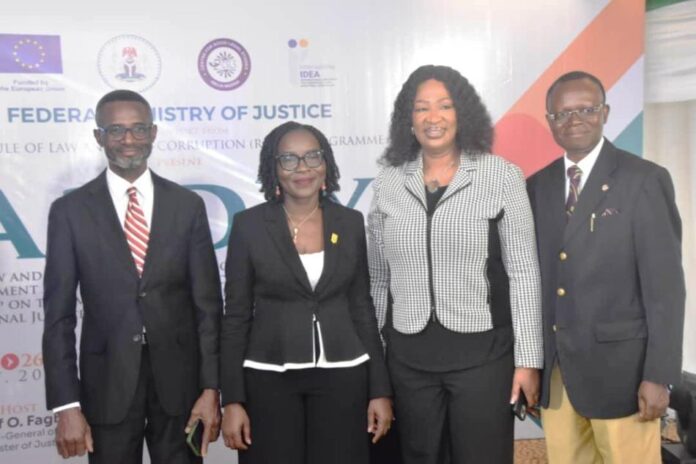
The Federal Government is set to put in place a National Minimum Standard on the implementation of Administration of Criminal Justice (ACJA) in the country.
The Honourable Attorney General of the Federation and Minister of Justice (HAGF), Lateef Fagbemi SAN, revealed this today Tuesday 24th September, 2024 at the commencement of a three-day review and validation of the National Minimum Standards Document and inauguration of the National Working Group on the Implementation of the Administration of Criminal Justice Act/Laws (ACJA/ACJLs) 2015.
The HAGF who was represented by the Solicitor General of the Federation and Permanent Secretary (SGF/PS), Mrs. Beatrice Jedy-Agba OON, mni, in his Keynote address, stated that the 3-Day Technical National Working Group Session Review and Validation of the National Minimum Standard Document for the implementation of ACJA, 2015, represented a significant milestone in Nigeria’s quest to reform the criminal justice sector by improving the administration of criminal justice and strengthen measures that ensure access to justice.
He reminded participants that “the Federal Government enacted the Administration of Criminal Justice Act in 2015, with a view to ensuring harmonious implementation of criminal justice reforms across the Federation. The Act provides for the administration of the criminal justice system which promotes efficient management of criminal justice institutions, speedy dispensation of justice, protection of the society from crimes and protection of the rights and interest of the suspect, the defendant and victims in Nigeria”.
“The adoption of the Act by States also ensures that offenders cannot move from state to state with a view to escaping justice, a term commonly known as Forum Shopping. Thus, with improved and uniform implementation of criminal justice reforms across the country, there will be no escape route for criminals, which will in turn contribute to socio-economic development in Nigeria”. He added.
The HAGF further enunciated that “the National Minimum Standards have been developed as a tool to implement the ACJA and consolidate collaboration between stakeholders in justice delivery by ensuring that Courts, both at the federal and state level, apply similar standards in the implementation of criminal procedures and enforcement of criminal justice. It is to this end that the National Working Group on the implementation of criminal justice reform was set up”.
The National Working Group comprises individuals and institutions of both the Federal and State Governments including Government Agencies, Civil Society Organizations, Lawyers and other stakeholders. It was set up to facilitate cooperation and collaboration between stakeholders across the federation. The aim of setting up the National Working Group was to ensure that the National Minimum Standards for Implementation of ACJA receives input, recommendations and wide acceptance from stakeholders across board. The establishment of the National Working Group was in response to the outcomes from the National Stakeholders Forum which was held in October 2023.
The Honourable Minister implored all the participants, members, and stakeholders to cooperate with the national working group so that they could achieve the mandate of bringing about the significant improvement expected in the day-to-day dispensation of criminal justice. He also encouraged the Working Group to address the issue of the availability of accessible data in the criminal justice system and leveraging technology.
In her welcome remarks, the Director Administration of Criminal Justice and Reform Department, Federal Ministry of Justice, Mrs. Leticia Ayoola-Daniels explained that initiative stemmed from the growing need for a unified framework that would address the persistent gaps in the implementation of the ACJA and ACJLs across the country.
She further explained that the challenges being experienced by the states and the Federal governments remained the same, which included court congestion, non-availability of data, delayed trials and a lack of uniformity in criminal justice processes. Hence, the need to finalize the document that would not only serve as a standard template across jurisdictions but also drove uniformity and efficiency in the implementation of those laws.
She was full of praises for the European Union, International IDEA, Rule of Law and Anti-Corruption Programme RoLAC, Professor Yemi Akinseye-George, SAN and the Technical Working Committee, the Federal Ministry of Justice and the CSLS Teams for their contributions and support, culminating in the 3-Day Technical National Working Group Session Review and Validation of the National Minimum Standard Document for the implementation of ACJA, 2015.
There were goodwill messages from Rule of Law and Anti-Corruption Programme RoLAC, Nigerian Bar Association, Bodies of States Attorneys-General, Independent Corrupt Practices and other Related Offences Commission (ICPC), Economic and Financial Crimes Commission, (EFCC), Nigerian Correctional Service (NCS), and the Nigerian Police.
Modupe Ogundoro
Director (I & PR)





